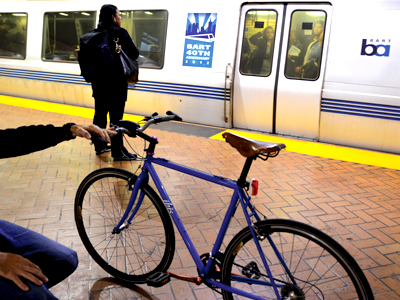
Effective December 1, BART will allow bikes on all trains at all times—with the exception of the peak commute hours (7 am to 9 am and 4:30 pm and 6:30 pm) when bikes will not be allowed to board the first three cars of any train. The first three car rule provides an option for those who want to avoid bikes altogether.
Other safety rules relating to bikes will still apply:
• no bikes allowed in the first train car at any time;
• bikes are never allowed on crowded trains;
• bicyclists must yield priority seating to seniors and those with disabilities; and
• bikes are not to block doorways or aisles and are not allowed on escalators.
BART says the decision to support bikes on BART trains is based on monitoring feedback from employees, results of improved signage, reviewing best bike rule practices from sister agencies, and increasing secure parking.
BART Board President Tom Radoluvich said supporting programs and changes have been made. “We reconfigured cars to allow for more space for riders with luggage, wheelchairs, strollers or bikes; launched our new bike etiquette campaign to encourage safe and courteous practices; and we continue to expand secure bike parking at our stations to help minimize the need to bring bikes on board, such as the 375 bike racks recently added in the paid area at seven stations.”
For many people, permanently removing the bike blackout means a safer commute.
“Because of the rush hour bike blackouts, I eventually broke down and bought a car to safely get to and from BART as a woman,” says Mira Luna, who commutes between San Francisco and Oakland. “This was after I was robbed walking home from BART at night after work. I am trying to transition back to a bike and BART lifestyle and lifting the blackouts will help immensely in getting women safely to and from the stations, as walking can be very dangerous at night in many parts of Oakland and some parts of San Francisco.”
BART is following the lead of other major cities in removing restrictions to integrating bikes and public transit. New York City, which has nearly 5 million transit trips per day, allows bikes on board its subway lines at all times. Los Angeles and Chicago also allows bikes on board at all times.
“By making full access for bikes on BART a permanent policy change, East Bay residents will have a new healthy and convenient commute option,” said Renee Rivera, Executive Director of the 4,500-member East Bay Bicycle Coalition. “This particularly benefits those who commute within the East Bay on BART lines where there is ample room for bikes, but who are restricted from bringing bikes on board by the current rules.”
BART ran three “Bikes on Board” pilot programs to test bike usage in the BART system. The first pilot took place in 2012, the next one ran this past March and the latest pilot is a five month test that began July 1. During all testing periods, BART invited comments from the public and conducted online random passenger surveys. BART invited 4,921 riders to take the survey. In March, 76% of those surveyed favored lifting the bike ban as long as the first three cars are bike-free during commute hours.
